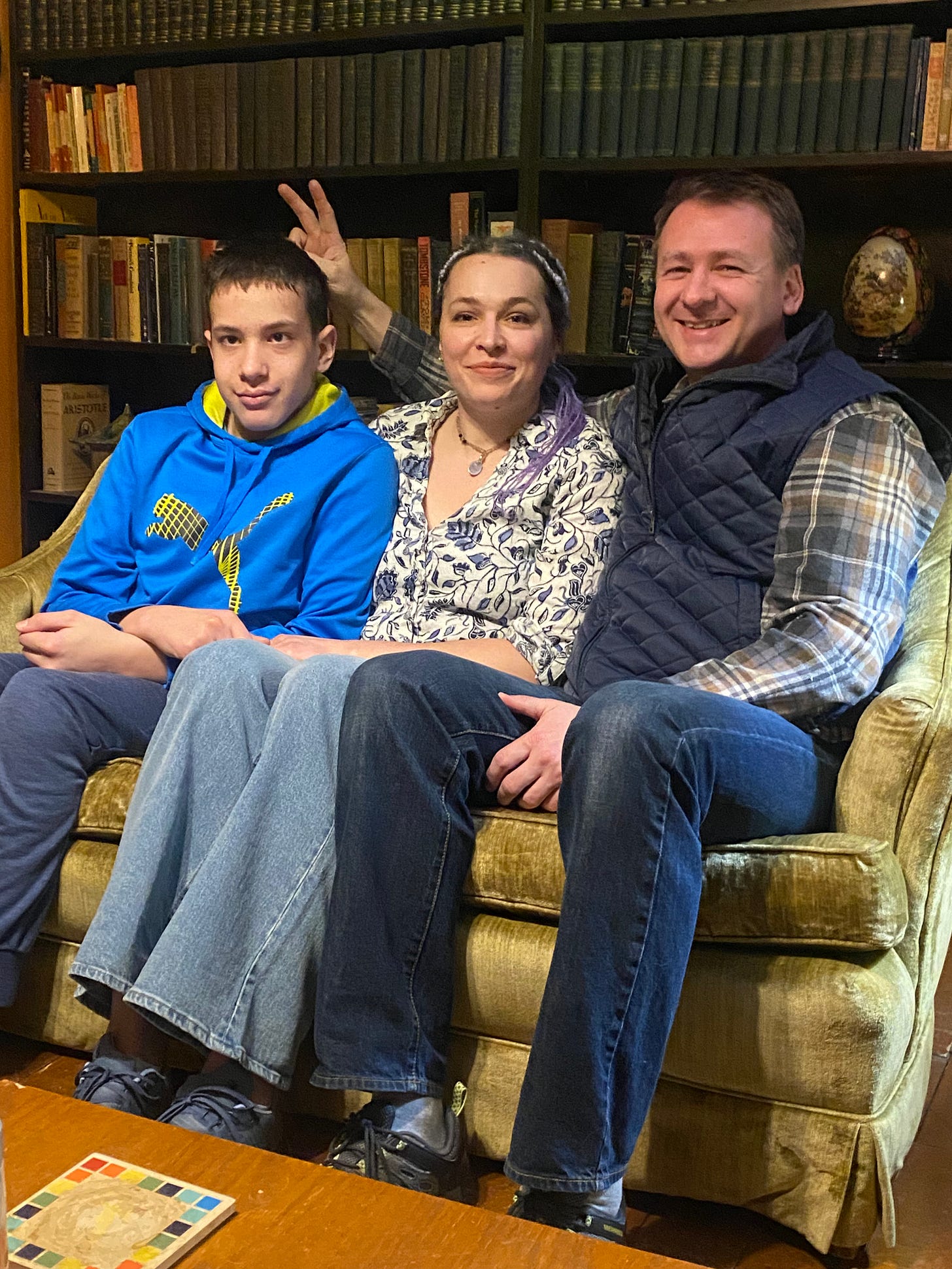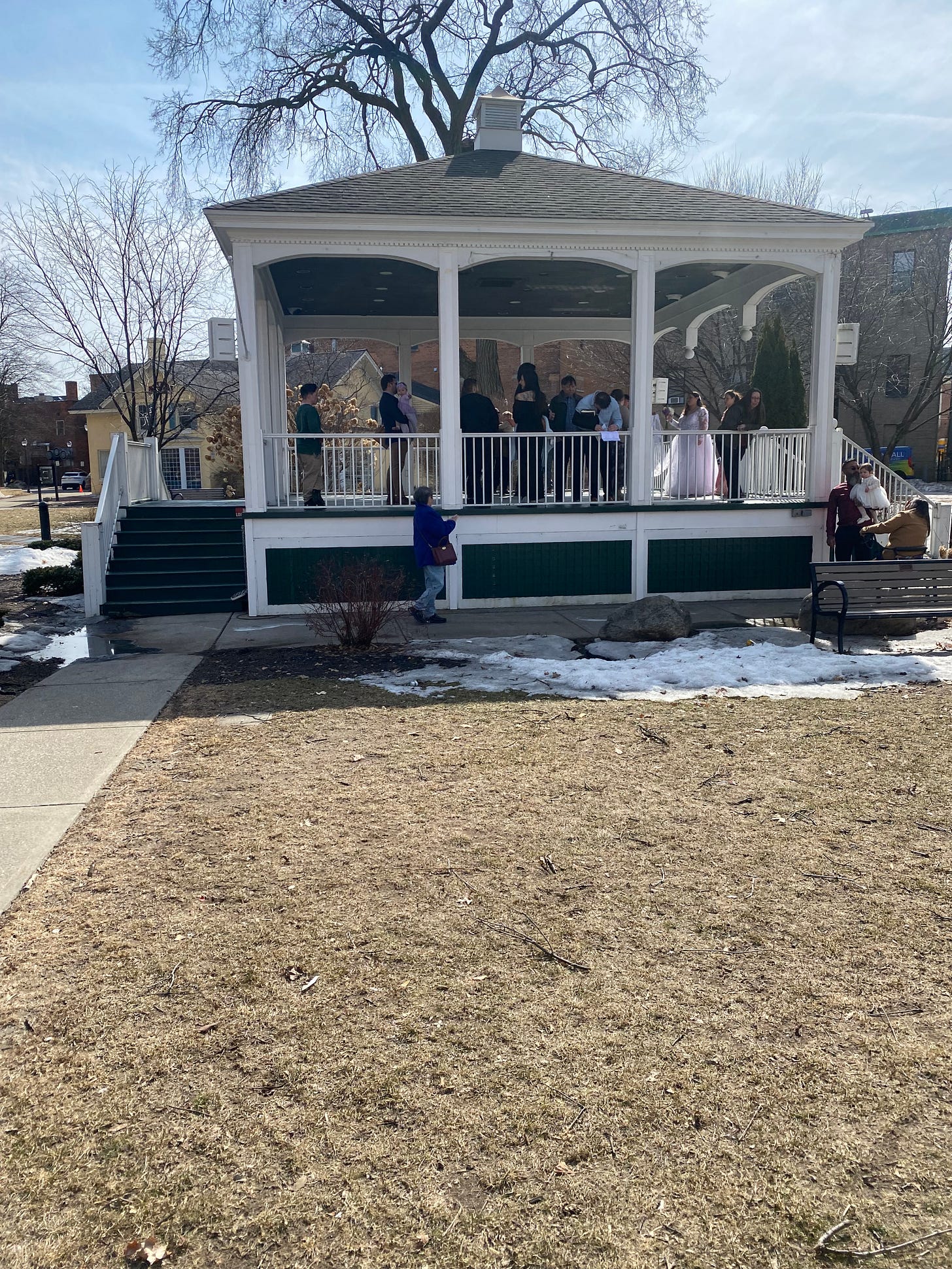Sending families back to Ukraine would be height of cruelty, low point for our country
Unfair coverage of the Adirondack Park Agency continues
Please consider supporting The Front Page with a paid subscription: HERE
Missiles hit the military airport at Ivano-Frankivsk, about a mile from the home of Oksana and Svitozar Zakhariia, on Feb. 24, 2022, the day Russia invaded Ukraine.
The blast wave swept over their house and woke their two sons — Rostyslav, who was 9 at the time, and Myroslav, who was one and a half.
Trained in the law, Svitozar had been working as a judge’s assistant, but after the invasion, he volunteered for territorial defense, doing nighttime patrols with police officers and guard service at blood collection sites, maternity wards and other health care facilities.
Oksana and the boys, along with her mother and her nephew, left the country on Feb. 26, driving for nearly 56 hours, snatching sleep, to Slovakia. For three days, they sheltered in a monastery, then continued to Brno in the Czech Republic, where a doctor lived who could perform surgery Rostyslav needed.
Rostyslav has spina bifida and required spinal surgeries every six to nine months to adjust the rods along his spine as he grew. He has had two more operations over the past two years at Albany Medical Center and surgery on his leg.
“The main reason we left Ukraine was the need of surgeries,” Svitozar said.
“That’s why we moved, mostly because of his medical history,” Oksana said.
They were sitting with me and Ringo (our dog) Thursday evening in the room in our house we call the library. Both are tall and smile often. Rostyslav was sitting in his wheelchair and listening as we talked. He is 12 now — almost 13, he pointed out — and in seventh grade at Queensbury middle school.
In 2023, the family came to the U.S. as part of the Uniting for Ukrainians program, established under President Joe Biden to help Ukrainians displaced by the war but with friends or family in the U.S. able to support them when they first arrived.
The program granted the refugees two years of humanitarian parole in the U.S., which participants could apply to have extended. The Zakhariias first went to Cohoes, where their friends lived, but moved to Queensbury last year, because Svitozar had gotten a job at Hacker Craft as a finisher in the final assembly department.
They managed to get their parole extended to 2027 before the Trump administration put the whole program on pause, but now they live in fear of having their parole status or Svitozar’s work authorization revoked.
Oksana works at Glens Falls Hospital as a patient care assistant. The family pays their own bills and pays taxes. They are contributing to their community, which is our community, and they are contributing to our country, despite the huge challenges they face and hardships they’ve overcome.
Svitozar showed me a frightening photo on his phone of an X-ray of Rostyslav’s spine before the surgeries, twisted sideways from scoliosis. Then he showed me one of the boy’s straightened spine, held in place by metal rods and pins on either side of each vertebrae.
Back in Ivano-Frankivsk in the winter of ’22-’23, Russians were targeting power plants with missiles, plunging the Zakhariias into darkness and cold.
“We could be without light for six hours. The house became very cold. His (Rostyslav’s) legs got cold in a second. They became blue in a second. Without opportunity to warm him or wash him with warm water … it was terrible,” Oksana said.
They have heard of other Ukrainians here who have recently had their humanitarian parole suddenly, unexpectedly revoked.
They have health insurance coverage here and access to hospitals and surgeons. They would not have health insurance back in Ukraine, and hospitals there have been bombed and surgeons are busy with wounded soldiers.
Rostyslav can get around Queensbury middle school in his wheelchair. At his school in Ukraine, grades 1-4 were held on the first floor, but older students were upstairs in a building with no elevator.
Rostyslav has been in school in Ukraine, Czechoslavakia, Cohoes and Queensbury over the past three years, Oksana said.
“It’s important when you have the kids to be in a stable position,” she said.
“I was thinking about going to school and build a better future for the kids here. I was thinking about going to SUNY Adirondack to get a better job. But now,” Oksana said, because of the uncertainty of their residency, “it makes no sense.”
Both she and Svitozar have master’s degrees in law from one of the top universities in Ukraine.
“I’m really afraid one day they will just woke up and say, OK, Ukrainians, you’re good to go. No place is safe in Ukraine now. Our health systems are very low. Society is wrecked, education, no help for disabled. All spheres in Ukraine are damaged,” she said.
“For living, you don’t just need a house,” she said. “For now, when there is war in the country, no one thinks about a wheelchair for a kid.”
It’s hard to imagine as Americans we are tolerating this — allowing our government to tear away the hope our government gave these good people.
Agreeing to protect the Zakhariias and other Ukrainians was an act of generosity, worthy of a great power like the United States. But it will be worth nothing if we send them back now to a precarious fate in a ruined, dangerous country.

Learning how to help
The Adirondack Regional Immigration Collaborative will be holding a free event Saturday, March 29 at the Park Theatre — a dinner where immigration will be discussed, along with how to help immigrants to our region. Space is limited, so all who are interested are asked to RSVP.
Adirondack Park Agency update
On March 3, the day after the publication in this space of my column, “Smear tactics threaten progress at Adirondack Park Agency,” the Essex County Board of Supervisors unanimously adopted a resolution that declared full confidence in APA Executive Director Barbara Rice.
At this past week’s APA board meeting, Jerry Delaney from the Local Government Review Board presented that resolution plus two others that also expressed support for Rice — one from the town of Indian Lake and the other from the Adirondack Association of Towns and Villages
The AATV is an alliance of local elected officials that represents the 101 towns and villages in the Adirondack Park and has, for most of its history, stood in steadfast opposition to the Park Agency.
It may be unprecedented in the 50-plus year history of the APA for the boards of municipalities in the park to formally express appreciation for the agency and its executive director. These resolutions mark a sea change in the relationship of the agency to Adirondack communities, although you wouldn’t know that from reading the coverage in the Adirondack Explorer.
The Explorer has adopted an adversarial stance toward the APA since Rice became its executive director. Even when covering other agency business, the Explorer’s stories frequently refer back to its hobbyhorses of APA criticism under Rice’s leadership — in particular, discontent among some always unnamed members of the agency’s staff.
Gwendolyn Craig’s story of March 13 on the meeting in which Rice was praised by local officials is a good example. Here is the story’s lead paragraph:
“The Adirondack Park Agency’s executive director addressed publicly for the first time on Thursday allegations of a toxic work environment made anonymously by half of the agency’s union employees in a letter sent by their union a month ago. APA board members and local government officials also rallied around Barbara Rice, who has led the agency for three years.”
The decades of acrimony between the APA and local communities and the positive change under Rice’s leadership is not explored in the story. The reader isn’t told why the relationship used to be so poisonous or how Rice came up with an antidote.
Instead, Craig spends most of the story rehashing reporting she has already had published several times — anonymous employee complaints about what they describe as an unfriendly atmosphere at work.
Although other employees have spoken up in defense of Rice and expressed how much they enjoy their work — two of them said so, with names attached, in my recent column — Craig makes no mention of that.
Instead, she reiterates the news from a couple of weeks ago of a letter of complaint from Martin Blair, a field representative for the Public Employees Federation, which was emailed to APA board members, supposedly on behalf of union employees. She does not explore the improper selective distribution of the letter, which was not even shown to union employees who support Rice. Not giving all union employees a chance to see the letter and express an opinion is unworthy of the ethos of inclusion and solidarity of a labor union. Also, since the letter is unsigned, we have to take Blair’s word that 20 employees endorsed it. But how committed can they be to the contents when they won’t even put their names to it?
Having written or edited tens of thousands of stories over more than 35 years in journalism, I know when a reporter is slanting their work. In the case of Craig’s coverage of the APA, the evidence is both in the small things — what she puts high up in her stories and what she buries or ignores, for example — and the big ones, such as speaking only with disgruntled union employees at the agency.
These columns of mine are commentary. I present my opinions, informed by my reporting and my knowledge of the people and the issues involved. As I said in my first column on this subject, Barb Rice is a longtime friend of mine. Readers are free to discount my opinion as loyalty to her or to conclude that my knowledge of her character gives me insight into what is really happening.
Craig’s stories get republished in the Adirondack Almanack and, frequently, in the Albany Times-Union. They are presented in the Explorer as impartial journalism, or, to quote Explorer Publisher Tracy Ormsbee, as “facts.” That means she has no business reporting and writing them in the way that she has.
More, more, more
For those who know something of the history of the APA’s relations with local counties, towns and villages, the discussion at a meeting of the Essex County Board of Supervisors, when the resolution in support of Rice was unanimously adopted, makes for fascinating reading. Here it is:
REGULAR BOARD Monday, March 3, 2025 - 10:00 AM Shaun Gillilland, Chairman James Monty, Vice-Chairman Chairman Gillilland called this Regular Board to order at 10 a.m. with the following supervisors in attendance: Clayton Barber, Matthew Brassard, Chris Clark, Derek Doty, Shaun Gillilland, Charlie Harrington, Steve McNally, James Monty, Cathleen Reusser, Favor Smith, Ike Tyler, Joe Pete Wilson, Margaret Wood and Mark Wright.
Robin DeLoria, Ken Hughes, Matt Stanley and Davina Thurston were excused.
RESOLUTION #60 – DECLARING FULL CONFIDENCE IN ADIRONDACK PARK AGENCY EXECUTIVE DIRECTOR BARBARA RICE. This resolution was moved by Mr. McNally, unanimously seconded, and duly adopted.
GILLILLAND: Twelve to allow it on the floor please?
GARRISON: Yes, we do.
MCNALLY: Shaun, can I speak on that for a second? I know that you don’t want to hear but I’ve been working in Government for over 20 years now and we in the Adirondack Park have the least rights of anybody in the state when it comes to our personal property and our land — being said, this limits our economic development, our available housing and I’ve been to many, many APA board meetings and Barb Rice and the current board right now have done a wonderful job. I’m sure everyone in this room has probably met Barb at one time or knows the board members. These people are accessible and they will listen to your concerns and going back years definitely I give Barb and that board my full support.
GILLILLAND: Thank you. Anything further on this issue?
REUSSER: I would just like to comment as a new supervisor last year shortly after taking office Barb Rice and Keith McKeever both came to my office and extended their help in helping the Town of Elizabethtown with all kinds of projects but especially our waste water and I have a huge amount of appreciation for the current leadership.
GILLILLAND: Thank you.
DOTY: I’d like to echo the same as far as full confidence. I have many different avenues of which Barb has helped me out over the years. We are very fortunate that in many instances I call it coming home for Barb so she hasn’t forgotten where she’s from or who she represents. So this is a great resolution. Thank you.
GILLILLAND: Thank you Mr. McNally for putting that together.
MONTY: I’d like to echo everything that everyone said here. She has not forgotten where her roots are Derek, you are extremely right. She thinks about what happens here and what we need here and I know there’s a lot of supposed turmoil up there but some of that turmoil is caused by her trying to hold people accountable which doesn’t necessarily bode well with some of the other interests at the Park Agency. Thank you.
GILLILLAND: Yes, I would echo that. I mean having an Executive Director up there and a board that actually recognize that those of us that live and work in the park have the greatest stake in the future of the park and are not just considered flotsam and jetsam in the way of a lot of agendas. Thank you very much for that.
LARAC show
LARAC is hosting the 120 Intercollegiate Regional exhibit this year, featuring works by college students located within 120 miles of Glens Falls, Saratoga Springs or Troy. There’s a lot of young talent on display.

Signs of spring
The signs are everywhere, from a full parking lot in the middle of last week at Hovey Pond, where children and young parents filled the play park, to the increased pace of work at the five or six (or is it seven?) construction sites on South Street. But on Thursday, Bella, Ringo and I passed an incontrovertible indication that spring, if not here, is very close — a wedding at the gazebo in City Park.







Your coverage of this Ukrainian couple’s courage and perseverance, in pursuing critical surgical procedures for their son, deepens our awareness of the ongoing sacrifices required by survivors of a war without imminent end. To have survived… and to have integrated as fully contributing community members…and now be further traumatized by the threat of deportation…would have been unimaginable in the not-so-distant past.
Their education in the legal profession, yet willingness to work in far less prestigious jobs to support themselves and ensure optimal education and health care for their son, demonstrates true citizenship, and serves as a role model for some home-grown Americans…those who choose to rely on “welfare services” while wearing their MAGA hats
and contributing $$$ to tRump campaigns to keep him out of prison.
Thank you for shining light on this family… which hopefully will lead to financial contributions which can provide legal support to keep them in our community indefinitely.
“A nation of sheep will beget a government of wolves.”- Edward R. Murrow